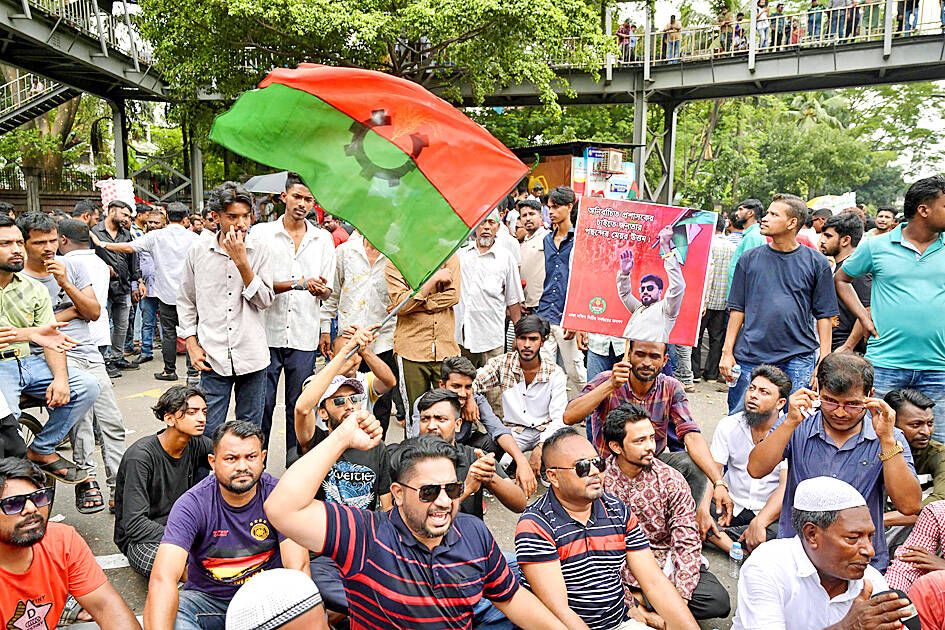Bangladesh’s interim leader was to meet multiple parties yesterday in marathon talks as he seeks to build unity and calm intense political power struggles, party leaders and officials said.
Bangladeshi Chief Adviser Muhammad Yunus, the 84-year-old Nobel Peace Prize winner who leads the caretaker government until elections are held, has called for rival parties to give him their full support.
The South Asian nation of about 170 million people has been in political turmoil since former Bangladeshi prime minister Sheikh Hasina was ousted by a student-led revolt in August last year, ending her iron-fisted rule of 15 years.

Photo: AFP
The talks come after meetings that stretched late into Saturday evening with major political parties, including those who have protested against the government this month.
“Chief adviser professor Muhammad Yunus will meet the leaders of several parties on Sunday,” his press secretary Shafiqul Alam said.
There are 54 registered political parties in Bangladesh — not including the now-banned Awami League of fugitive former leader Hasina.
Alam did not specify how many parties were invited to this round of talks.
Mamunul Haque, leader of the Islamist Khelafat-e-Majlish party, said he was attending discussions expected to focus on “the ongoing crisis.”
Zonayed Saki of the liberal Ganosamhati Andolon party said he was also attending.
After a week of escalation during which rival parties protested on the streets of the capital Dhaka, the government led by Yunus warned on Saturday that political power struggles risked jeopardizing gains that have been made.
“Broader unity is essential to maintain national stability, organize free and fair elections, justice, and reform, and permanently prevent the return of authoritarianism in the country,” it said in a statement.
Microfinance pioneer Yunus, who returned from exile at the behest of protesters in August last year, said he has a duty to implement democratic reforms before elections he has vowed would take place by June next year at the latest.
The caretaker government has formed multiple reform commissions providing a long list of recommendations — and is now seeking the backing of political parties.
Yunus last held an all-party meeting — to discuss efforts to overhaul Bangladesh’s democratic system — on February 15, and some parties cited frustration at the lack of contact.
On Saturday, the government warned that it had faced “unreasonable demands, deliberately provocative and jurisdictionally overreaching statements,” which it said had been “continuously obstructing” its work.
Sources in his office and a key political ally on Thursday said that Yunus had threatened to quit, but his cabinet said he would not step down early.
Yunus on Saturday met with the Bangladesh Nationalist Party (BNP), seen as the election front-runners, who are pushing hard for polls to be held by December.
According to local media and military sources, army chief General Waker-Uz-Zaman last week said that elections should be held by December, aligning with BNP demands.
Yunus also met with leaders of Jamaat-e-Islami, the Muslim-majority nation’s largest Islamist party, and the National Citizen Party (NCP), made up of many students who spearheaded the uprising that ended Hasina’s rule.
The NCP’s leader, Nahid Islam, said on Saturday that rival parties were pushing for swift elections to skip reforms and “assume power,” and that he believed there were “indications” that a “military-backed government could re-emerge.”
Meanwhile, the first trial yesterday began at a special court prosecuting former senior figures connected to the ousted government, the chief prosecutor said.
The court in Dhaka accepted a formal charge against eight police officials in connection to the killing of six protesters on August 5 last year, the day Hasina fled the country as the protesters stormed her palace.
The eight men are charged with crimes against humanity. Four are in custody and four are being tried in absentia.

‘HYANGDO’: A South Korean lawmaker said there was no credible evidence to support rumors that Kim Jong-un has a son with a disability or who is studying abroad South Korea’s spy agency yesterday said that North Korean leader Kim Jong-un’s daughter, Kim Ju-ae, who last week accompanied him on a high-profile visit to Beijing, is understood to be his recognized successor. The teenager drew global attention when she made her first official overseas trip with her father, as he met with Chinese President Xi Jinping (習近平) and Russian President Vladimir Putin. Analysts have long seen her as Kim’s likely successor, although some have suggested she has an older brother who is being secretly groomed as the next leader. The South Korean National Intelligence Service (NIS) “assesses that she [Kim Ju-ae]

In the week before his fatal shooting, right-wing US political activist Charlie Kirk cheered the boom of conservative young men in South Korea and warned about a “globalist menace” in Tokyo on his first speaking tour of Asia. Kirk, 31, who helped amplify US President Donald Trump’s agenda to young voters with often inflammatory rhetoric focused on issues such as gender and immigration, was shot in the neck on Wednesday at a speaking event at a Utah university. In Seoul on Friday last week, he spoke about how he “brought Trump to victory,” while addressing Build Up Korea 2025, a conservative conference

DEADLOCK: Putin has vowed to continue fighting unless Ukraine cedes more land, while talks have been paused with no immediate results expected, the Kremlin said Russia on Friday said that peace talks with Kyiv were on “pause” as Ukrainian President Volodymyr Zelenskiy warned that Russian President Vladimir Putin still wanted to capture the whole of Ukraine. Meanwhile, US President Donald Trump said that he was running out of patience with Putin, and the NATO alliance said it would bolster its eastern front after Russian drones were shot down in Polish airspace this week. The latest blow to faltering diplomacy came as Russia’s army staged major military drills with its key ally Belarus. Despite Trump forcing the warring sides to hold direct talks and hosting Putin in Alaska, there

North Korea has executed people for watching or distributing foreign television shows, including popular South Korean dramas, as part of an intensifying crackdown on personal freedoms, a UN human rights report said on Friday. Surveillance has grown more pervasive since 2014 with the help of new technologies, while punishments have become harsher — including the introduction of the death penalty for offences such as sharing foreign TV dramas, the report said. The curbs make North Korea the most restrictive country in the world, said the 14-page UN report, which was based on interviews with more than 300 witnesses and victims who had